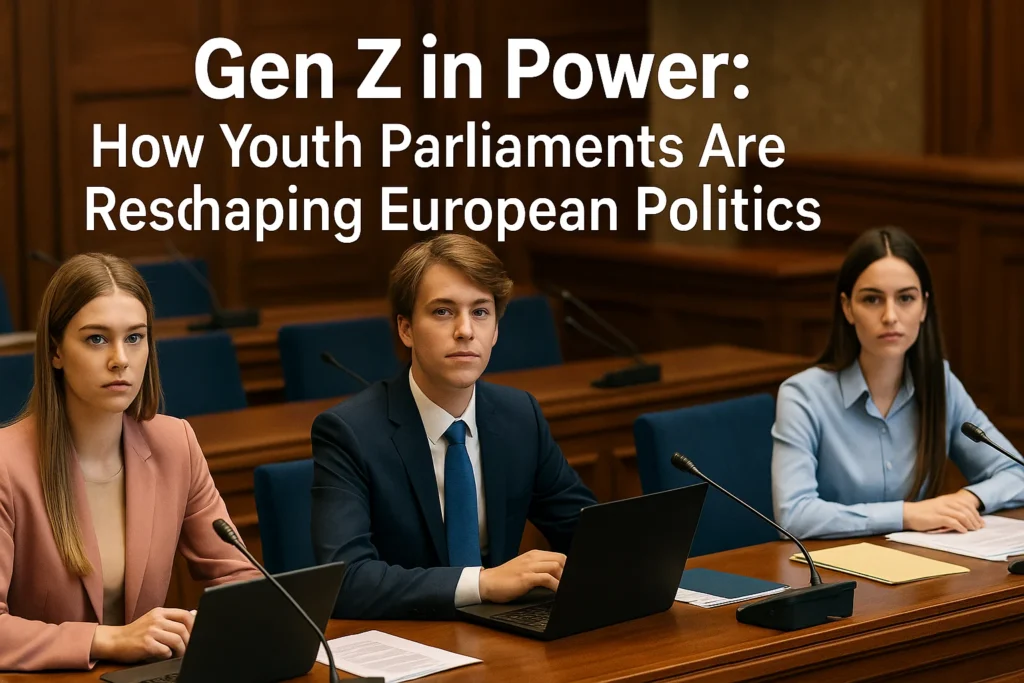For generations, the halls of power in Europe have largely been the domain of seasoned politicians, their decisions shaping the lives of citizens from youth to old age. Yet, a quiet but profound transformation is taking root across the continent. Young voices, once relegated to symbolic gestures or protest movements, are increasingly finding formal seats at the policy-making table. Nations like Norway and the Netherlands, long champions of progressive governance, are leading the charge, empowering youth councils and parliaments to play vital, structured roles in shaping national and local policies.
This isn’t about teenagers suddenly wielding legislative gavels to pass laws, but rather a deeper, more fundamental integration of youth perspectives into the democratic process. It’s a recognition that the decisions made today will disproportionately affect tomorrow’s generations. By giving young people formal avenues to influence policy, Europe is not just fostering active citizenship; it’s building more resilient, representative, and future-oriented democracies. The generation that grew up with the internet, global awareness, and climate change as a constant backdrop is now stepping forward, proving that age is no barrier to profound political engagement.
The Evolution of Youth Engagement: Beyond Tokenism
For a long time, youth participation in politics often felt like a symbolic gesture. Youth parliaments might convene, debates might be held, and resolutions passed, but their impact on actual government policy often remained minimal. Young people were seen as recipients of policy, not creators of it. This often led to disillusionment and a feeling of “tokenism” – being included for show, but not for substance.
However, a significant shift has occurred, driven by several factors:
- Youth Disengagement Concerns: Alarming rates of youth voter apathy and disengagement from traditional politics spurred governments to find new ways to connect.
- Unique Perspectives: Governments began to realize that young people bring unique perspectives on issues like climate change, digital transformation, mental health, and education – issues that are profoundly shaping the future.
- Fostering Democratic Values: Engaging youth early in democratic processes helps to cultivate civic responsibility, critical thinking, and a sense of ownership over their societies.
- The Power of Gen Z: The current generation of young people (Gen Z) is characterized by high levels of social awareness, digital fluency, and a strong desire for authentic engagement. They demand more than just a voice; they demand influence.
This led to a re-evaluation of how youth engagement is structured. The goal shifted from simply “listening to youth” to actively “involving youth” in meaningful ways that directly impact decision-making processes, marking a move beyond mere tokenism towards genuine political participation.
Norway: A Model of Structured Youth Influence
Norway stands out as a leading example of how youth voices can be deeply embedded within the political system, particularly at the municipal level. While Norwegian youth councils don’t directly pass national laws, their influence is formalized and significant, providing a powerful model for meaningful youth participation.
At the heart of Norway’s approach are municipal youth councils (Ungdomsråd). These councils are not just advisory bodies; they often have formal rights to:
- Be Heard and Consulted: Local authorities are often legally obliged to consult youth councils on matters directly affecting young people, such as urban planning, school budgets, public spaces, and cultural initiatives. Their opinions must be taken seriously and formally considered.
- Initiate Proposals: Youth councils can propose their own initiatives and policies to local government, advocating for specific changes or projects that benefit their peers.
- Manage Budgets: In some municipalities, youth councils are even allocated specific budgets that they manage independently, giving them direct responsibility for projects and initiatives aimed at young people in their communities. This hands-on experience provides invaluable lessons in governance and resource allocation.
- Direct Representation: Members of youth councils might even have the right to attend or speak at municipal council meetings, bringing their perspectives directly to decision-makers.
The Norwegian National Youth Council (Landsrådet for Norske Barne- og Ungdomsorganisasjoner – LNU) acts as a powerful umbrella organization, lobbying national government and coordinating efforts among local councils, ensuring youth concerns are heard at the highest levels. This structured approach ensures that youth voices are not just heard, but are an integral part of the governance framework.
The Netherlands: Building Bridges to Policy
The Netherlands, much like Norway, has been steadily working to strengthen the influence of its younger generation in political decision-making. While the Dutch National Youth Council (Nederlandse Jeugdraad – NJR) and various local youth councils don’t possess legislative power, they operate as crucial bridges between young people and policy-makers, significantly reshaping policy outcomes.
The Dutch model emphasizes consultation, advice, and direct dialogue as key avenues for influence:
- Formal Advisory Role: Youth councils, at both national and local levels, are formally consulted on new policies and legislation that affect youth. Government bodies are expected to seek and consider their input before making final decisions.
- Policy Recommendations: The NJR, often in collaboration with various youth organizations, develops comprehensive policy recommendations on a wide range of issues, from mental health and education to climate change and employment. These recommendations are presented directly to ministries, parliamentary committees, and even the Prime Minister’s office.
- Youth Delegates to International Forums: The Netherlands actively sends youth delegates to international forums like the United Nations, where they advocate for youth rights and represent Dutch youth perspectives on a global stage. This exposure also brings international best practices back into domestic discussions.
- Structured Dialogue: The Dutch government frequently organizes structured dialogues and events where young people can directly engage with ministers and policymakers, fostering a sense of shared ownership over national challenges.
Through these mechanisms, youth councils in the Netherlands have successfully influenced policy changes related to mental health services for young people, educational reforms, and climate action plans. Their power lies in their organized, informed advocacy and their ability to represent a collective youth voice that governments increasingly cannot afford to ignore.
Mechanisms of Influence: How Youth Councils Reshape Policy
While direct legislative power remains rare, European youth councils exert significant influence through a variety of formal and informal mechanisms. Their ability to “reshape politics” comes from their strategic positioning and sustained engagement:
- Formal Consultation Rights: Many European countries, inspired by models in Scandinavia, have implemented legislation or official guidelines requiring government bodies (national ministries, local municipalities) to formally consult youth councils on policies relevant to young people. This means their input isn’t optional; it’s a mandatory step in the policy development process.
- Budgetary Oversight (for specific funds): Some youth councils are given oversight or direct management of specific budget lines related to youth initiatives, cultural programs, or sports facilities. This provides practical experience in governance and ensures funds are allocated in ways that genuinely benefit young people.
- Right to Speak in Committees: Members of youth councils may be granted the right to present their views directly to parliamentary committees or local council meetings, allowing them to advocate for their positions before decisions are finalized.
- Policy Papers and Reports: Youth councils regularly produce well-researched policy papers, reports, and position statements that are shared with policymakers, media, and the public. These documents serve as authoritative sources of youth perspectives.
- Shadowing and Mentorship Programs: Many youth councils facilitate programs where young people can shadow politicians, civil servants, or even local mayors. This provides invaluable insight into governance processes and builds connections that can lead to future influence.
- Media Engagement and Public Awareness: Youth councils are increasingly adept at using social media and traditional media to raise awareness about issues important to young people, putting public pressure on decision-makers.
These mechanisms combine to create a powerful ecosystem of influence. Youth councils act as a crucial feedback loop, ensuring that policies are informed by the lived experiences and future aspirations of the younger generation, leading to more responsive and effective governance.
A Generation Rising: Why Gen Z Demands a Seat at the Table
The current generation of young people, often referred to as Gen Z, is unlike any before it. Born into a digital world, exposed to global issues from an early age, and facing unprecedented challenges like climate change and economic instability, they are acutely aware of the stakes involved in political decisions. This awareness translates into a powerful demand for genuine participation.
- Digital Natives: Gen Z grew up with instant access to information and global connectivity. They are adept at using social media for advocacy, organizing, and expressing their views, making them a highly networked and vocal generation.
- Global Citizens: Issues like climate change, human rights, and global pandemics resonate deeply with a generation that understands interconnectedness. They are less bound by national borders in their activism and more inclined to seek systemic change.
- High Social Awareness: Studies show Gen Z tends to be more socially conscious, prioritizing issues like sustainability, mental health, and social justice. They want to see these values reflected in policy.
- Future-Oriented: Facing existential threats like climate change, Gen Z feels a direct impact from long-term policy decisions. They demand a say in the future they will inherit.
- Distrust of Traditional Institutions: Many young people express skepticism towards traditional political institutions, viewing them as slow, unresponsive, or out of touch. This fuels their desire to create alternative avenues for influence and direct participation.
By actively engaging youth through formal structures, European nations are not just being politically progressive; they are strategically tapping into a dynamic and engaged demographic. Empowering Gen Z in governance helps rebuild trust in democratic institutions, injects fresh energy and ideas, and ensures that policy-making is truly forward-looking.
The Road Ahead: Challenges and the Promise of Deeper Democracy
While the trend of empowering youth governments in Europe is undeniably positive, the journey towards full and meaningful participation is not without its challenges.
- Avoiding Tokenism: The biggest ongoing challenge is to ensure that youth participation remains genuinely impactful and and doesn’t revert to being merely symbolic. Governments must commit to truly listening and acting on youth recommendations.
- Resource Allocation: Youth councils need adequate funding, training, and logistical support to operate effectively, conduct research, and engage their peers.
- Diversity and Inclusivity: Ensuring that youth councils truly represent the diversity of young people (including those from marginalized communities, different socio-economic backgrounds, and varying political views) remains crucial.
- Bridging the Age Gap: While young people are gaining influence, fundamental power structures still reside with older generations. Effective communication and mutual respect are vital to bridge this gap and translate youth ideas into actionable policies.
- Sustaining Engagement: Keeping young people continuously engaged requires dynamic approaches, relevant issues, and visible impacts that demonstrate their efforts are making a real difference.
Despite these hurdles, the progress being made in countries like Norway and the Netherlands offers a powerful glimpse into the future of democratic governance. By formally integrating youth voices, Europe is investing in a more dynamic, inclusive, and legitimate political landscape. This commitment to youth empowerment signals a profound evolution, reshaping European politics not just for the benefit of young people, but for the resilience and relevance of democracy itself in a rapidly changing world.




Your point of view caught my eye and was very interesting. Thanks. I have a question for you.